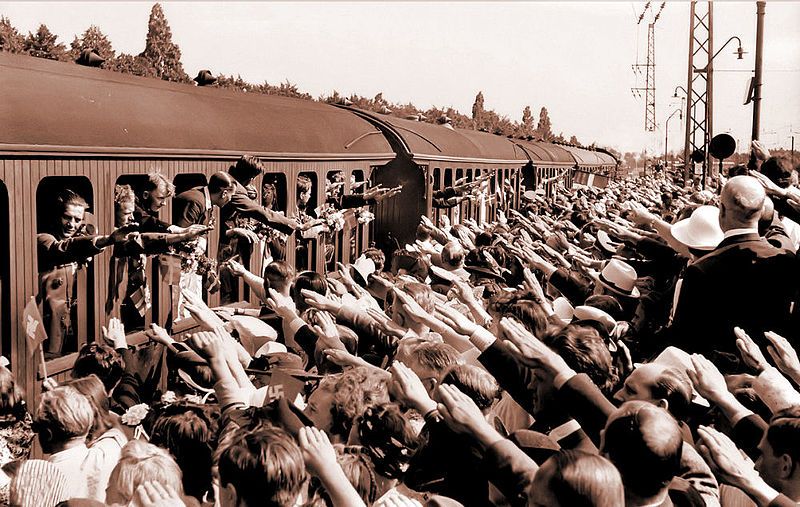The recent theft of Second World War documents from Rigsarkivet, the state archives, garnered international attention. Over the course of a decade, two men had set about deliberately pilfering key documents that related to the participation of Danes in volunteer German units. Nazi sympathisers, apparently motivated by the desire to ‘rewrite history’, the two men have inadvertently reminded us of one of Denmark’s less than noble historical truths. Over the course of the war, thousands volunteered to fight for the Nazis, seeing action on the battlefields of Europe and the Soviet Union, from Berlin to Leningrad.
Following the occupation of Denmark in 1940 under the guise of ‘protecting’ the Danes from a British invasion, the Nazis set about recruiting from the population. The Danish Nazi Party was a leading force in the recruitment drive, and through its newspaper ‘Fatherland’ it attempted to extol the virtues of fighting for the Germans. Not surprisingly, few took up the initial offer; however, numbers increased following Germany’s invasion of the Soviet Union in 1941.
Although some volunteers were recruited from the ethnically German parts of Denmark, these were still firmly in the minority as the men who fought for the Nazis were drawn from a wide cross-section of Danish society. Some ascribed to the same extremist ideology as the Nazis, while others joined for financial reasons. Surprisingly, the regular army officers of the Danish Royal Army were permitted to join – encouraged to do so by the German diplomat Cecil von Renthe-Fink, who all but ran the Danish government.
READ MORE: Famous Danish WWII resistance fighter passes away
Sent to the eastern front
The Danish ‘Free Corps’ was one volunteer Danish force, formed in June 1941. Sporting a Danish flag with the words ‘Frikcorps Danmark’ in the upper left corner, the corps was disbanded in 1943 after seeing action in Latvia and the Soviet Union, fighting alongside veteran German units including the 1 SS Infantry Brigade. When the corps first returned to Denmark after their initial experiences in combat, they received a hostile welcome from Danish civilians. Street fights were not uncommon. Considering that many Danes were either supportive of the Danish resistance, or actively involved in it, this was not surprising.
Another more notorious unit involving Danes was the 11th SS Volunteer Panzergrenadier Division Nordland. Comprised of mostly Scandinavians, the unit also included a wide range of other nationals from countries including Spain, Switzerland, Estonia and France. Under Hitler’s direct orders, the division was remodelled in 1943 under foreign officers and put into action for the first time, fighting Tito’s partisans in the former Yugoslavia.
By 1944, the Nordland division had been moved to the Eastern Front, seeing action in and around Leningrad. As the Soviets broke out of the German encirclement, the Nordland division retreated, eventually moving with the rest of Hitler’s forces out of the Soviet Union and into eastern Europe. The unit withdrew repeatedly until 1945 when it became clear that the Soviet advance couldn’t be halted.
READ MORE: The innkeeper and his brood, whose resistance empowered Denmark
More resistance sympathisers
It is sadly ironic that by the end of the war, there were Danish volunteers fighting to defend Berlin while their countrymen in the resistance were escalating their attacks in cities across Denmark. By May, the Nordland division had been decimated, but they still attempted to fight on, no doubt aware of the repercussions of defeat should they be handed back to their respective governments. Following the unconditional surrender of Germany on 8 May 1945, many of the Nordland volunteers were taken prisoner by the Soviets and marched east, while others attempted to make it to Allied lines. Those who did were taken prisoner and sent home, facing newly hostile governments that tried many of them as traitors.
While the participation of Danish volunteers in Nazi units is a sore point in Danish history, it must be remembered that fascism and Nazism were not unique to Germany alone, and that there was some support for Hitler’s ideology in other countries around the world. Many countries, including Britain, Australia and the United States, had extreme right-wing political movements in the 1930s – the Great Depression precipitated by the Wall Street Crash of 1929 had lent weight to their anti-communist stance. While some of its countrymen fought for the Nazis, the Danes were not the only ones to do so – a point that is easier to understand considering that Denmark was under occupation for most of the war.
However, attempting to steal evidence of the past is no way to change that. The fact that more Danes sympathised with the resistance than the Nazis speaks for itself; to deny historical truths is a dangerous and damaging exercise. In the end, it pays to recognise history, no matter how shameful, as only then are we able to reconcile ourselves with it.
















